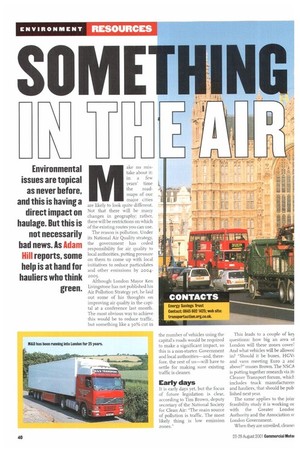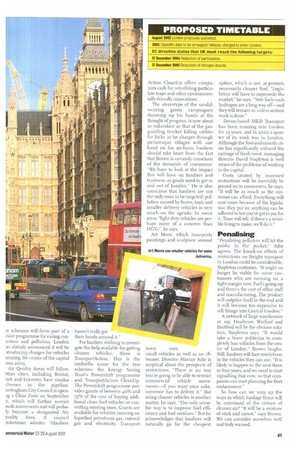11111 ake no mis take about it: in a few years time
Page 40

Page 41

If you've noticed an error in this article please click here to report it so we can fix it.
the roadmaps of our major cities
are likely to look quite different. Not that there will be many changes in geography; rather, there will be restrictions on which of the existing routes you can use.
The reason is pollution. Under its National Air Quality strategy, the government has ceded responsibility for air quality to local authorities, putting pressure on them to come up with local initiatives to reduce particulates and other emissions by 20 04' 2005.
Although London Mayor Ken Livingstone has not published his Air Pollution Strategy yet, he laid out some of his thoughts on improving air quality in the capital at a conference last month. The most obvious way to achieve this would be to reduce traffic, but something like a 30% cut in the number of vehides using the capital's roads would be required to make a significant impact, so this is a non-starter. Government and local authorities—and, therefore, the rest of us—will have to settle for making sure existing traffic is cleaner.
Early days
It is early days yet, but the focus of future legislation is clear, according to Tim Brown, deputy secretary of the National Society for Clean Air: "The main source of pollution is traffic. The most likely thing is low emission zones."
This leads to a couple of key questions: how big an area ol London will these zones cover? And what vehicles will be allowed in? "Should it be buses, FIG1/5 and vans meeting Euro 2, and above?" muses Brown. The NSCA is putting together research via it Cleaner Transport forum, whick includes truck manufacturen and hauliers, that should be pub lished next year.
The same applies to the join: feasibility study it is working or with the Greater Londor Authority and the Association o' London Government.
When they are unveiled, cleane:
ir schemes will form part of a Ader programme for easing con,estion and pollution. London as already announced it will be atroducing charges for vehicles ntering the centre of the capital :-om 2003.
Air Quality Areas will follow. /ther cities, including Bristol, 'lark and Leicester, have similar themes in the pipeline. iot t ingham City Council is openrg a Clear Zone on September o, which will further restrict oods movements and will probaly become a designated Air !uality Area. A council pokesman admits: "Hauliers haven't really got their heads around it."
For hauliers wishing to investigate the help available for getting cleaner vehicles, there is TransportAction. This is the umbrella name for the two schemes: the Energy Saving Trust's Powershift programme and TransportAction CleanUp. The Powershift programme provides grants of between 40% and 75% of the cost of buying additional clean fuel vehicles or converting existing ones, Grants are available for vehicles running on liquefied petroleum gas, natural gas and electricity. Transport Action Clean LJ p offers companies cash for retrofitting particulate traps and other environmentally-friendly innovations.
The stereotype of the sandalwearing green campaigner, throwing up his hands at the thought of progress, is now about as redundant as that of the gasguzzling trucker killing rabbits for kicks as he charges through picturesque villages with one hand on his air-horn; hauliers should take heart from the fact that Brown is certainly conscious of the demands of commerce. "We have to look at the impact this will have on hauliers and business, as goods need to get in and out of London." He is also conscious that hauliers are not the only ones to be targeted; pollution caused by buses, taxis and smaller delivery vehicles is very much on the agenda. In some areas "light duty vehicles are perhaps more of a concern than HGVs", he says.
Art Move, which transports paintings and sculpture around town, uses
small vehicles as well as an IStonner. Director Alastair Adie is sceptical about the prospects of restrictions. "There is no way you're going to be able to restrict commercial vehicle movements—if you want your cake, someone has to deliver it." But using cleaner vehicles is another matter, he says. "The only sensible way is to improve fuel efficiency and fuel residues." But he acknowledges that hauliers will naturally go for the cheapest
option, which is not, at present, necessarily cleaner fuel. "Legislation will have to supersede the market," he says. "New fuels such hydrogen are a long way off—and they will remain so unless serious work is done."
Devon-based M&D Transport has been running into London for 25 years, and in 2000 a quarter of its work was in London. Although the foot-and-mouth crisis has significantly reduced the carriage of fresh meat, managing director David Stapleton is well aware of the problems of working in the capital.
Costs created by increased restrictions will be inevitably be passed on to consumers, he says. "It will be as much as the customer can afford. Everything will cost more because of the legislation they put in; anything can be adhered to but you've got to pay for it. Time will tell: if there's a sensible living to make, we'll do it."
Penalising
-Penalising polluters will hit the public in the pocket," Adie agrees. The knock-on effects of restrictions on freight transport in London could be considerable, Stapleton continues. "It might no longer be viable for some customers who are running on a tight margin now. Fuel's going up and there's the cost of office staff and manufacturing. The product will outprice itself in the end and it will become too expensive to sell things into Central London."
A network of large warehouses at, say, Heathrow, Watford and Dartford will be the obvious solution, Stapleton says. "It would take a brave politician to completely ban vehicles from the centre of London," Brown laughs. Still, hauliers will face restrictions in the vehides they can use. "It is likely to happen in the next three or four years, and we need to start signalling that now, so that companies can start planning for fleet replacement."
So how can we sum up the ways in which haulage firms will be convinced of the virtues of cleaner air? "It will be a mixture of stick and carrot," says Brown. We can consider ourselves well and truly warned.




























































































































